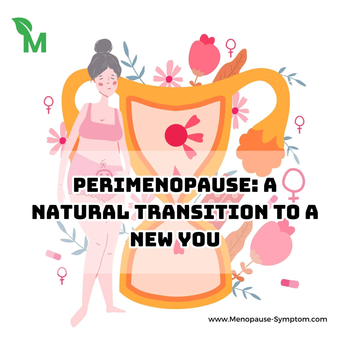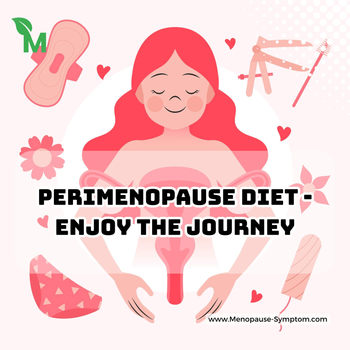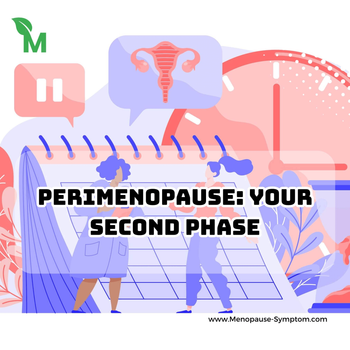Perimenopause: The Perimenopause Diet To Feel Younger Longer
On
07/10/2024Reading time:
1 min
Summary:
Perimenopause is an important transitional period in a woman's life. During this period, the body begins to experience major changes, especially in hormones, leading to many symptoms such as hot flashes, mood swings, and weight gain.
To overcome perimenopause easily and feel younger longer, diet plays an important role.
1. Understanding Perimenopause
Perimenopause is the time when the body begins the natural transition to menopause, marking the end of a woman's reproductive years. Perimenopause is also known as the menopausal transition, at which time the body will no longer have an ovulation cycle, menstruation will disappear, and fertility will no longer be possible. This period usually occurs between the ages of 45-50, and can last 2-5 years depending on the person.
Some common symptoms during this stage include:
Irregular periods
Hormonal changes affect the release of eggs from the ovaries and this can cause periods to be delayed or shortened or stop for a few months. Menstrual bleeding may be lighter or heavier and may occur after the age of 40.
Hot flashes
Sudden hot flashes and sweating are the most common signs of perimenopause, which can vary in duration or intensity throughout the day and night, accompanied by snoring and difficulty sleeping. Hot flashes can last from 2-5 years. When estrogen levels drop, blood vessels can dilate rapidly and cause skin temperature to rise. This can cause a hot feeling that spreads from the chest to the shoulders, neck and head. Sweating that dries up causes the skin to lose a lot of heat, leading to chills, fatigue and lethargy. Hot flashes can last from 30 seconds to 30 minutes.
Perimenopause brings many challenges, but it can also become an opportunity for women to renew their lives. Changing eating habits is an important part of managing uncomfortable symptoms. A nutritious diet not only helps reduce perimenopause symptoms but also benefits your overall health, helping you feel more active and full of life.
2. General Principles of Perimenopause Diet
When building a diet for perimenopause, pay attention to foods that can help balance hormones and reduce symptoms. The basic principles include:
· Increase green vegetables and fruits: These foods are rich in vitamins, minerals and antioxidants, which will help slow down the aging process.
· Choose plant proteins: Beans, nuts, and whole grains provide essential protein without increasing bad cholesterol levels.
· Cut back on sugary foods: Sugar can cause hormonal imbalances, leading to more severe symptoms during perimenopause.
· Drink enough water: Water helps keep the body hydrated, reduces hot flashes, and improves skin.
· Pay attention to healthy fats: Vegetable oils, fatty fish, and avocados contain omega-3s that help improve mood and heart health.
3. Foods to Add to Your Diet
a. Soy Products
Soy products such as tofu and soy milk are rich in phytoestrogens, which have estrogen-like effects in the body, helping to ease perimenopause symptoms and maintain bone health.
b. Whole Grains
Whole grains such as wheat, oats, and quinoa provide fiber, which helps improve digestion and regulate blood sugar, which is especially important during perimenopause.
c. Fruits
Berries, apples, bananas and oranges are not only delicious but also provide vitamin C, fiber and antioxidants, which help improve heart health and skin.
d. Seafood
Fish, especially salmon and mackerel, provide omega-3s and protein, which support brain function and reduce the risk of disease during menopause.
e. Nuts
Chia seeds, flax seeds and walnuts are rich in omega-3s and lignans, which help balance hormones and maintain a positive mood.
4. Control Emotions Through Diet
Perimenopause affects not only the body but also the mind. Many women may experience emotional instability and anxiety. To calm the mind, meals need to be carefully tended:
· Use spices: Turmeric, ginger and cinnamon not only add flavor but also have health benefits, helping to reduce inflammation and improve mood.
· Add fermented foods: Yogurt, kimchi, and sauerkraut contain probiotics that benefit the digestive system, boost immunity, and stabilize mood.
5. Benefits of Exercise to Support Your Diet
In addition to a healthy diet, exercise is also extremely important during perimenopause. Combining diet with exercise helps:
· Effective weight loss: Exercise helps burn calories, reducing the risk of weight gain due to hormonal changes during perimenopause.
· Improve cardiovascular health: Exercises such as walking, cycling and yoga help control blood pressure and increase blood circulation.
· Help you sleep better: Regular exercise can help improve sleep, which is very important for women in perimenopause.
6. Some Special Tips
Diet for perimenopause is not just about following certain rules. Listen to your body, and if necessary, consult a doctor or nutritionist. Here are some helpful tips:
· Fresh foods: Prioritize fresh foods over processed foods for more nutrition.
· Don't skip meals: Eating regular meals helps stabilize blood sugar and curb cravings.
· Manage stress: Stress can increase perimenopause symptoms, so try relaxation techniques like meditation or yoga.
· Take vitamins: Learn about the vitamins women need during perimenopause, such as vitamin D and calcium, to maintain strong bones.
7. The Importance of Diet
By now, you've probably realized the importance of a perimenopause diet, which not only improves physical health but also boosts confidence and a positive spirit. This stage is a great time to develop healthy lifestyle habits that will help you feel younger and more vibrant.
Conclusion
The transition from perimenopause to menopause is a natural journey that every woman goes through. By developing a sensible diet, you can not only reduce the symptoms but also enjoy life more fully. Changing your perimenopause diet can be the key to not only living a healthy life but also feeling younger and more energetic as you age. Start today to feel the difference!
Source: Team MPS compiled, analyzed and wrote. Please dont reup without source. Many thanks.

Perimenopause: A Natural Transition To A New You
Invalid Date
Perimenopause is an important stage in a woman's life, marking the transition from the reproductive period to a new and meaningful stage. Many people often see perimenopause as something negative, but in fact it is an opportunity to discover yourself again and prepare for self-renewal.

Perimenopause Diet - Enjoy The Journey
09.02.2024
Perimenopause is an important transitional stage in a woman's life with many changes in health and psychology. This stage usually lasts from 2 to 10 years, with many signs such as hot flashes, insomnia, and mood swings.

Perimenopause: Your Second Phase
Invalid Date
When entering perimenopause, the female body undergoes exciting and challenging physiological changes.
